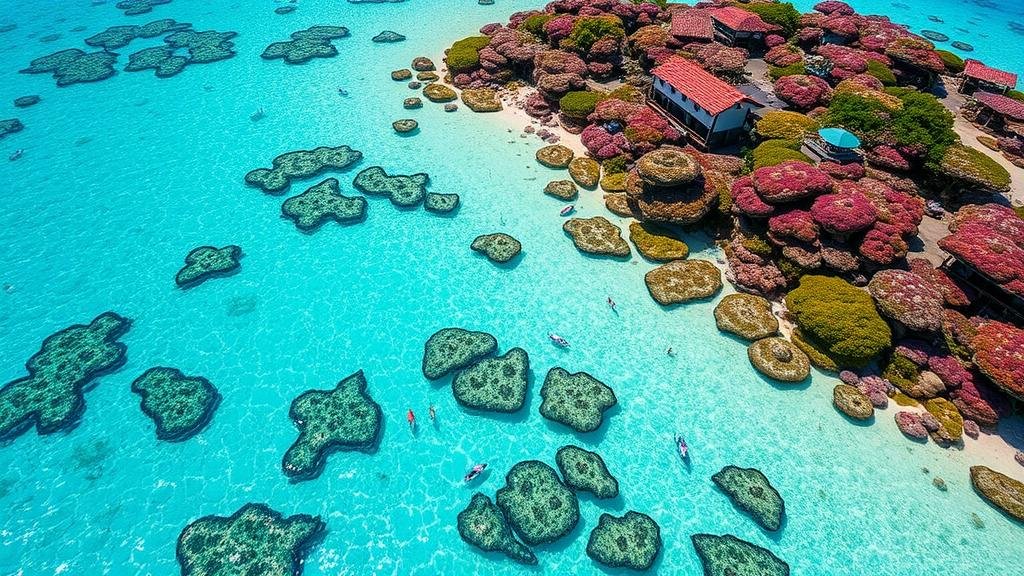Documenting the vibrant coral atolls of the Maldives’ untouched reefs.
Documenting the Vibrant Coral Atolls of the Maldives’ Untouched Reefs
The Maldives, an archipelago nestled in the heart of the Indian Ocean, is renowned for its breathtaking coral atolls, rich marine biodiversity, and stunningly clear waters. With over 1,192 coral islands spread across 26 atolls, the Maldives is home to some of the most pristine reefs in the world. This article delves into the significance of documenting these vibrant ecosystems, the challenges they face, and the conservation efforts in place to protect them.
The Importance of Coral Atolls
Coral atolls play a critical role in marine ecosystems. provide habitats for numerous species, protect coastlines from erosion, and contribute to local economies through tourism and fisheries. According to the World Resources Institute, coral reefs support around 25% of all marine life, showcasing their vital importance to biodiversity.
Documenting these atolls not only helps raise awareness about their plight but also contributes to scientific research. For example, data collected about coral bleaching events can help researchers understand ecosystems responses to climate change. Effective documentation can highlight changes in reef health, track biodiversity, and inform conservation strategies.
Case Study: The Baa Atoll Biosphere Reserve
Designated a UNESCO Biosphere Reserve in 2011, Baa Atoll exemplifies the effort to maintain biodiversity within the Maldives. The atoll is home to Hanifaru Bay, recognized for its seasonal gathering of manta rays and whale sharks. These unique phenomena attract both tourists and researchers alike, leading to increased interest in monitoring the health of the reefs.
By employing advanced technologies, such as underwater drones and remote sensing, scientists can collect essential data on coral health over time. A study published in the journal Coral Reefs in 2020 highlighted a notable decline in coral cover due to rising sea temperatures, emphasizing the urgency of documenting these changes.
Challenges Facing Coral Reefs
The vibrant reefs of the Maldives are threatened by several factors:
- Climate Change: Rising sea temperatures contribute to coral bleaching, a phenomenon where corals expel the algae that provide them with color and nutrients.
- Pollution: Coastal development and improper waste disposal can degrade water quality, leading to harmful algal blooms that suffocate corals.
- Overfishing: Unsustainable fishing practices can disrupt the balance of marine ecosystems, leading to declines in fish populations that are vital for coral health.
According to data from the Intergovernmental Panel on Climate Change (IPCC), ocean temperatures could rise by 1°C to 3°C by 2100, creating unfavorable conditions for coral survival. This reality highlights the importance of proactive documentation and conservation strategies.
Conservation Efforts in the Maldives
Efforts to protect the coral reefs of the Maldives have gathered momentum in recent years. The Maldivian government has implemented several initiatives aimed at preserving these precious ecosystems:
- Marine Protected Areas (MPAs): Over 20 MPAs have been established to safeguard against destructive fishing practices and pollution.
- Community Engagement: Local communities are engaged in conservation efforts, such as reef restoration projects and sustainable tourism practices.
- Research and Monitoring: Partnerships with international conservation organizations facilitate ongoing research and monitoring of reef health.
For example, the Maldives Marine Research Centre (MRC) collaborates with global organizations to gather data and develop strategies to combat coral bleaching. Such collaborations have helped shape policies that prioritize reef restoration and educate the public about sustainable practices.
Actionable Takeaways
To contribute to the conservation of the Maldives’ coral reefs, individuals can take actionable steps:
- Support sustainable tourism initiatives when visiting the Maldives, choosing operators that practice reef-friendly policies.
- Participate in local conservation programs, either by volunteering or donating to organizations focused on marine biodiversity.
- Educate others about the importance of coral reefs and the threats they face, fostering a collective responsibility for their future.
By documenting and actively working towards the protection of the Maldives’ vibrant coral atolls, we can ensure the survival of these breathtaking ecosystems for generations to come. In doing so, not only do we safeguard marine life, but we also protect the livelihoods of those who depend on these natural treasures.



